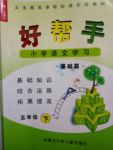题目内容
Fortunately, the little girl ________ in the air-crash, but unluckily, the others on the flight were killed.
A. was survived B. has been survived C. was surviving D. survived
D
考查时态。根据上下文可知是对过去事件的描述,故用一般过去时。

 小学学习好帮手系列答案
小学学习好帮手系列答案 小学同步三练核心密卷系列答案
小学同步三练核心密卷系列答案When I was in medical college, I went camping with some of my friends. The season was summer; therefore, we chose to go to the seaside. After arriving there, we rent a room and left our luggage there. We finished lunch and then decided to rent a boat because the sea and the weather were beautiful.
We started to row, but about one mile out, the weather suddenly changed. Although the weather was not good, we didn't want to give up, but finally my friends and I agreed that we should go back. We tried to change the boat's direction, but as soon as we changed it, the oarlock (桨架)broke. Therefore, we were unable to turn back. We had to wait for help because we couldn't do anything.
After seeing the change of weather, we shouldn't have continued to row, but it was too late. We regretted(后悔) it. The sea changed a lot, the waves got very high, and the boat began to shake like a cradle(摇篮). One of my friends started to cry; another started to vomit(呕吐). Three hours passed, and nobody came to help us. We were just praying.
Fortunately, after five long hours of waiting, two big boats came to rescue us and we escaped. If they hadn't come to get us, we would have crossed the border between Turkey and Greece because the border was very close.
This story is the most exciting story of my life because we could have died, but luck was with us and we escaped.
【小题1】What does the author mainly tell us in this passage?
| A.An experience at sea. |
| B.An exciting experience when swimming. |
| C.The changeable weather at the seaside. |
| D.It is dangerous to boat at sea. |
| A.In the morning. | B.In the afternoon. | C.In the evening. | D.At night. |
| A.they went camping at the seaside | B.they went on rowing |
| C.the waves got very high | D.they started too late |
| A.he came down with a disease | B.they stayed three hours at sea |
| C.the boat shook too much | D.nobody came to help them |
Sydney—A shark savaged a schoolboy's leg while he was surfing with his father at a beach in Sydney on February 23.It was the third shark attack along the coast of Australia's largest city in a month.
The 15-year-old boy and his father were in the water off Avalon,on Sydney's northern beaches,around dawn when he was attacked.The city's beaches are packed with locals and tourists during the summer months.
“The father heard a scream and turned to see his son thrashing(激烈扭动)about in the water,”the police said.“Fortunately,the shark swam away and the boy was helped to the shore by his father.”
Lifesaving Club spokesman Nick Miller said,“It got him around the top of his left leg and the father came and dragged him out of water.”He said the boy was bleeding heavily when he was brought to the shore.“There was a lot of pain,as you can imagine.”The teenager was airlifted to hospital for treatment for leg injuries.
Police said the bites “cut through to the bone”,but the boy did not appear to have sustained any fractures (骨折).He was in a stable condition now.
Several beaches were closed after the attack.Water police and lifeguards were searching for the shark,while the police hoped to identify its species by the shape of the bite marks.But they said it was too early to say what type of shark attacked the boy.“I don't even know if he saw it,”Miller said.
Many shark species live in the waters off Sydney's beaches,but attacks on humans are still relatively rare.However,there were two attacks on successive days earlier this month,one on a navy diver in Sydney harbor,not far from the famous Opera House,and the other on a surfer at the city's world-famous Bondi beach.
Fishermen say shark numbers are on the rise.There is a ban on commercial fishing in the harbor,which has increased fish stocks.Marine experts also claim environmental protection has created a cleaner environment,attracting sharks closer to the shore as they chase fish.Many shark species,including the Great White—the man-eaters made famous in Steven Spielberg's Jaws—are protected in Australian waters.
【小题1】The report mainly tells us ________.
| A.shark attacks on humans are on the rise |
| B.sharks attacked humans three times in one month |
| C.a boy was attacked by a shark at a Sydney beach |
| D.shark numbers are increasing in the waters off Sydney's beaches |
| A.attracted | B.dragged | C.bit | D.packed |
B.Sydney harbor is not far from the famous Opera House.
C.There are many locals and tourists on its coast all the year round.
D.There are few shark species in the waters off Sydney's beaches.
【小题4】About the injury of the boy we know that ________.
| A.he was losing much blood when he was dragged out |
| B.he was very nervous when he was sent to hospital |
| C.he may be in danger of losing his leg |
| D.he was injured in the right leg |
| A.environmental protection has created a cleaner environment |
| B.a ban on commercial fishing has increased fish numbers |
| C.many shark species are protected in Australian waters |
| D.the film Jaws has made the Great White famous |